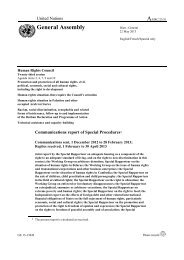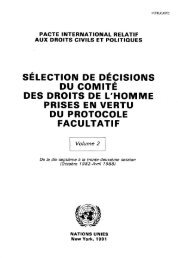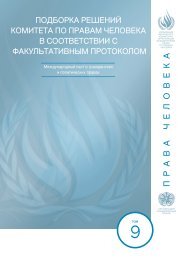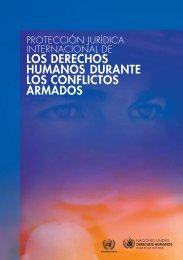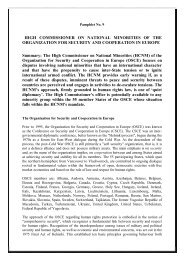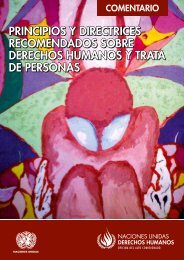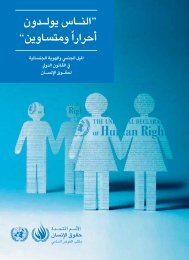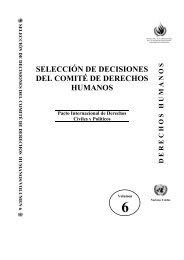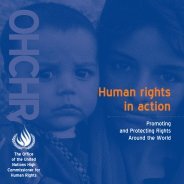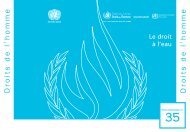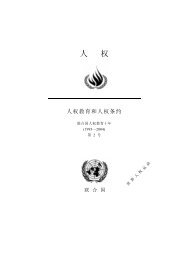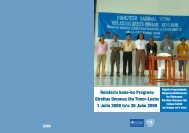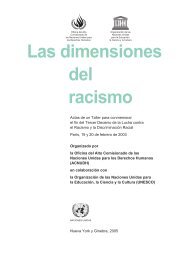good governance practices for the protection of human rights
good governance practices for the protection of human rights
good governance practices for the protection of human rights
Create successful ePaper yourself
Turn your PDF publications into a flip-book with our unique Google optimized e-Paper software.
However, <strong>the</strong> ef<strong>for</strong>t to reduce police corruption met with significant obstacles<br />
and ultimately failed. One <strong>of</strong> <strong>the</strong> primary responsibilities <strong>of</strong> <strong>the</strong> La Paz police was<br />
patrolling <strong>the</strong> public market: collecting rents, maintaining health standards, and<br />
monitoring <strong>the</strong> accuracy <strong>of</strong> weights and measures. Over time, a culture developed<br />
in which police <strong>of</strong>ficers boosted <strong>the</strong>ir salaries through kickbacks from <strong>the</strong><br />
stallholders. Corruption in <strong>the</strong> police <strong>for</strong>ce resulted in lower city revenues, <strong>the</strong><br />
violation <strong>of</strong> health norms and <strong>the</strong> cheating <strong>of</strong> consumers through false weights<br />
and measures.<br />
However, <strong>the</strong> plan to fire corrupt police <strong>of</strong>ficers and <strong>the</strong>ir supervisors was sabotaged.<br />
Police families resisted <strong>the</strong> new policy. Also, <strong>the</strong> stallholders did not<br />
welcome a change in <strong>the</strong> status quo, fearing even worse <strong>practices</strong> in <strong>the</strong> future.<br />
Nei<strong>the</strong>r stallholders nor residents perceived corruption as affecting <strong>the</strong>ir daily<br />
lives. The mayor and his team had failed to communicate to <strong>the</strong> public <strong>the</strong> tangible<br />
benefits <strong>of</strong> reduced police corruption: lower taxes, fair weights and measures <strong>for</strong><br />
consumers, and safe food <strong>for</strong> families and children. They had not conducted adequate<br />
research to understand which facets <strong>of</strong> <strong>the</strong> public market were important<br />
to citizens and to <strong>the</strong>n communicate <strong>the</strong> value <strong>of</strong> <strong>the</strong> anti-corruption drive as a<br />
means <strong>of</strong> achieving <strong>the</strong>se goals. As a result, <strong>the</strong> plan was not implemented as <strong>the</strong><br />
mayor was voted out <strong>of</strong> <strong>of</strong>fice in <strong>the</strong> next elections.<br />
Impact on <strong>human</strong> <strong>rights</strong> and challenges<br />
The mayor <strong>of</strong> La Paz and his team made great strides. During <strong>the</strong>ir five years in<br />
<strong>of</strong>fice, corruption was greatly reduced and <strong>for</strong>eign donors contributed funds to<br />
increase <strong>the</strong> salaries <strong>of</strong> employees. Importantly, city revenues and investment in<br />
public works increased tenfold. As a result <strong>of</strong> higher city revenues, <strong>the</strong> delivery<br />
<strong>of</strong> municipal services improved.<br />
However, questions regarding <strong>the</strong> sustainability <strong>of</strong> <strong>the</strong>se achievements emerged<br />
when Ronald MacLean-Abaroa was not re-elected and his successors dismantled<br />
some <strong>of</strong> his anti-corruption initiatives and undermined effective administration<br />
via nepotism and political appointments. By 1995, corruption had almost returned<br />
to pre-1985 levels. It became evident that <strong>the</strong> anti-corruption ef<strong>for</strong>ts <strong>of</strong><br />
<strong>the</strong> late 1980s were not supported by a system <strong>of</strong> checks and balances backed<br />
by society at large. There was inadequate civic education on <strong>the</strong> consequences<br />
<strong>of</strong> corruption, which contributed to <strong>the</strong> low public demand <strong>for</strong> accountability.<br />
Greater input from <strong>the</strong> public might have created <strong>the</strong> checks and balances required<br />
<strong>for</strong> sustainable re<strong>for</strong>ms. For example, pr<strong>of</strong>essional groups, <strong>the</strong> media and<br />
neighbourhood associations might have been possible supporters.<br />
However, it is important to emphasize that <strong>the</strong> battle against corruption is a longterm<br />
process and that it takes many years to build a civic culture which values<br />
accountability and transparency. Ronald MacLean-Abaroa was <strong>the</strong> first democratically<br />
elected mayor <strong>of</strong> <strong>the</strong> city <strong>for</strong> 40 years and, although voted out <strong>of</strong> <strong>of</strong>fice<br />
in 1991, he was re-elected in 1996 on a re<strong>for</strong>m plat<strong>for</strong>m. By that time, neighbourhood<br />
associations and civil actors were stronger and better able to bolster<br />
anti-corruption ef<strong>for</strong>ts through <strong>the</strong>ir work as monitors.<br />
73



